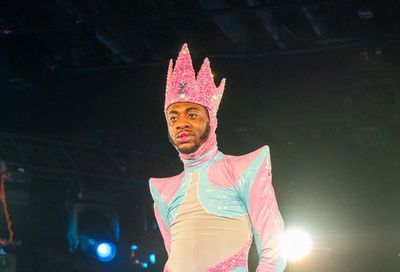Virginia Republicans Pass Transgender Sports Ban
The Virginia House of Delegates also passed a bill to force teachers to "out" transgender students to their parents.

The Virginia House of Delegates passed a bill seeking to ban transgender individuals from competing on sports teams matching their gender identity.
They also passed another measure that would require teachers to inform parents if their children begin identifying as transgender or nonbinary at school.
The bills, which passed on largely party-line votes, echo similar measures pushed by Republican-led legislatures in other states obsessing over LGBTQ-related issues, especially those involving transgender identity, and other allegedly “woke” concepts that do not conform to traditional gender or sex-based assumptions or mores.
The first bill, HB 1387, introduced by Del. Karen Greenhalgh (R-Virginia Beach), was passed on Monday, Feb. 6, by a 51-47 margin. It seeks to prohibit transgender females from competing in interscholastic, intramural, or club sports specifically designated for girls.
However, the bill does not prohibit cisgender females from competing in male-designated sports, such as football.
The bill requires all sports teams for students in grades K-12, and at the collegiate level, to be designated as for boys, girls, or co-ed, based on a student’s assigned sex at birth.
Under the bill, any student wishing to be eligible to play must submit a form signed by a licensed physician, nurse practitioner, or physician assistant attesting to their biological sex.
Additionally, public schools and universities would be prohibited from competing against private schools — unless the private school adopts a similar biological sex-verification standard.
The bill prohibits any government entity, licensing or accrediting organization, or athletic association from accepting a complaint, opening an investigation, or “taking any other adverse action” against a school for barring children from competing on teams that do not match their gender identity, unless the sport has been designated as “co-ed.”
It also allows for litigious students or parents of students who believe they’ve missed out on athletic opportunities or awards due to the participation of a transgender student to sue for damages.
Proponents of the bill say it’s essential to preserving the integrity of sports and ensuring women can compete and excel, as, they claim, transgender females who have gone through male puberty will always retain an unfair physical advantage over cisgender females.
“Even the strongest, fastest girls in Virginia must step up to the starting line and know, ‘I can’t win,'” Greenhalgh said of being forced to compete against trans athletes. “Their goals are gone, their chance at winning and recognition and scholarship — it’s just not fair for women to lose these opportunities.”
Greenhalgh told WTOP that she’s not concerned about what will likely be a small number of women who lose out on athletic opportunities.
“It’s not how many women are going to have their dreams crushed — it’s that it can happen, and we need to make sure that it doesn’t,” she told the D.C.-based radio station. “If one girl loses her chance to win, that’s enough.”
Opponents say the measure overstates the degree to which transgender students participate in sports and the advantage they enjoy.
Other opponents noted that provisions calling for the yearly physical examination of students to determine their physical ability to compete would require students to disrobe in front of a physician or nurse practitioner.
Currently, students can be ruled physically able to compete by undergoing simple medical tests or readings, such as taking someone’s blood pressure, without disrobing in front of an adult.
Del. Danica Roem (D-Manassas), the first — and only — transgender lawmaker to be elected in the commonwealth, spoke forcefully against the bill when it was brought up for debate on the floor.
She criticized supporters of the bill for claiming they want to “support” female athletes, saying that anti-trans advocates often fail to show up for female athletes in other ways.
“When we want to deal with the idea of how we support women athletes, how about we show up to their games? How about we pay them equally? Right now in the WNBA…the highest-paid person gets $200,000. Compare that to the NBA, where the highest-paid person gets more than $44 million dollars in a year. And we haven’t even talked about the [salary] floor in each of those [sports],” Roem said.
“How many times have any of you here gone to a girls’ basketball game, followed by a boys’ basketball game, where the girls’ game starts at 5 or 5:30, and the boys’ game starts at 7 or 7:30, and you saw the gym get packed at the very end of the fourth quarter of the girls’ game, because so many people there were excited about the boys’ game, regardless of how competitive, regardless of the skills, regardless of the rankings of the girls’ team, often when they’re playing the exact same school?” Roem continued.
“If we want to support female athletes, then show up to their games, fight for equal pay for them. But at the same time, to beat up on trans kids because nine trans kids last year wanted to play sports, we’re now going to affect a policy for more than 1.2 million students…because we had it out to make life a little bit harder, a little bit more miserable for those kids.”
Also on Monday, the House passed HB 2432 by a margin of 50-48. The bill requires any teacher, principal or other administrator, school board school official, or other school district employee to inform a student’s parents if said student begins self-identifying as a gender different from their biological sex.
The school employee must ask if parents are aware of the student’s mental state, and if they wish to obtain counseling for their child.
The bill also requires local Boards of Education to include in its guidelines for “criteria to assess whether students have begun to self-identify as a gender different from their biological sex and criteria for notification of and discussions with parents of students self-identifying as a gender different from their biological sex.”
The measure prohibits school counselors, social workers, or psychologists from encouraging or coercing such students from withholding information about their gender identity from their parents, and defines “abused or neglected child” so that parents who insist on referring to their children by their birth name and pronouns corresponding to their biological sex shall not be accused of abuse or neglect.
Known as “Sage’s Law,” the bill is named after a female student who socially transitioned and began identifying as a boy at school, but no longer does. The student was ultimately trafficked after meeting someone she met online and running away from home due to ongoing bullying at school that was never reported to her parents or guardians.
Proponents say that schools should be required to inform parents of any developments with their children regarding gender identity, pointing to Sage’s experience as an extreme example of what can happen when parents are kept in the dark about such developments.
Opponents of the law argue it will only serve to “out” transgender-identifying students to their parents well before they’re ready, destroying what little trust exists between teachers and students.
Some also worry that more conservative parents may mistreat or bully their children, kick them out of their homes, or seek out religious “conversion therapy” to convince their children that their gender identity is “wrong.” (Virginia law bans conversion therapy by licensed therapists, but does not prevent non-licensed religious or spiritual advisors from engaging in it.)
Opponents are also skeptical of the bill due to its sponsorship by Del. Dave LaRock (R-Hamilton), a right-wing lawmaker with a history of opposing LGBTQ representation, visibility, or expansions of LGBTQ rights.
The bill was initially combined with a similar measure, HB 1707, introduced by Del. Tara Durant (R-Fredericksburg) before being passed through committee on a party-line vote, and passed on the floor with the support of most Republicans.
Detractors of both bills vowed to defeat the measures in the Virginia Senate, which Democrats control by a 22-18 margin. If they manage to keep at least one of two conservative Democrats — Sen. Joe Morrissey (Richmond) or Sen. Chap Petersen (Fairfax City) — in line, both bills will be defeated.
The commonwealth’s top LGBTQ organization, Equality Virginia, called passage of the bills a “shameful effort to gain cheap political points.”
“Today the Virginia House voted to pass a trans athlete ban, and a forced outing bill,” the organization tweeted. “Right now our priority is caring for our community, and focusing our efforts to defeat these bills in Senate. Rest. There is another fight ahead and you are essential to victory.”
Support Metro Weekly’s Journalism
These are challenging times for news organizations. And yet it’s crucial we stay active and provide vital resources and information to both our local readers and the world. So won’t you please take a moment and consider supporting Metro Weekly with a membership? For as little as $5 a month, you can help ensure Metro Weekly magazine and MetroWeekly.com remain free, viable resources as we provide the best, most diverse, culturally-resonant LGBTQ coverage in both the D.C. region and around the world. Memberships come with exclusive perks and discounts, your own personal digital delivery of each week’s magazine (and an archive), access to our Member's Lounge when it launches this fall, and exclusive members-only items like Metro Weekly Membership Mugs and Tote Bags! Check out all our membership levels here and please join us today!





























You must be logged in to post a comment.